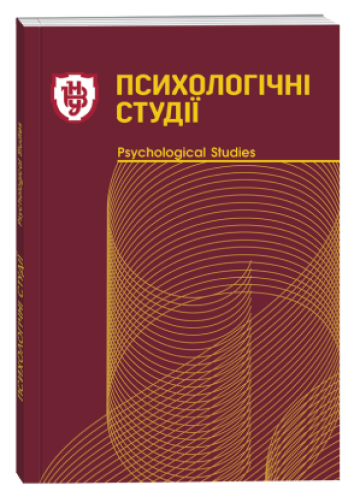THE ROLE AND SIGNIFICANCE OF TASKS OF EXPERIMENTAL AND DIAGNOSTIC CONTENT IN THE PROFESSIONAL TRAINING OF STUDENTS OF PSYCHOLOGICAL AND PEDAGOGICAL PROFESSIONS
DOI:
https://doi.org/10.32782/psych.studies/2023.2.2Keywords:
professional training (formation), task, modelling, experimental and diagnostic activity.Abstract
Based on the analysis of some scientific approaches in the study of the process of professional training in modern higher education, the author of the article analyzes some problematic aspects of this process, and also offers his conceptual vision for its improvement. Further ways of professional growth of specialists in the field of psychological and pedagogical specialties should be sought in the field of deepening their practical training, emphasizing the formation of relevant skills and abilities in them, as well as directing efforts to mastering various interactive, diagnostic-prognostic and interpretive-corrective programs, techniques, procedures. At the same time, any educational content (and professional content in particular) becomes a subject of assimilation only when it takes the form of a specific task for the subject of learning, which in the future directs and stimulates his activity. In addition, solving problems in education is both a goal and a means, and therefore this process should and should be considered as one of the main methods that ensure its success. The whole value of the problem-based approach lies in the fact that the subject of learning, operating with knowledge, assimilates it. When choosing experimental-diagnostic activity as an important means of stimulating professional development, we were guided by the methodological position, according to which the main goal of the psychology of experimentation is the disclosure and assimilation of patterns of functioning of thinking. After all, acquiring knowledge, the individual does not change anything in them by himself. Instead, the subject of educational (or educational and professional) activity itself becomes the subject of changes. Therefore, for the normal process of personal and professional formation of an individual, it is important for him to have such a subjectivity or, in other words, such readiness for educational activities, which will be based on the reflection of his own self-change.
References
Балл Г.О., Войтко В.І. Узагальнена інтерпретація поняття моделі. Філософська думка. 1976. № 1. С. 58–64.
Белей М.Д. Задача як інструмент реалізації виховних функцій в умовах дитячих оздоровчих закладів. Збірник наукових праць: психологія. Івано-Франківськ : Вид-во ДВНЗ «Прикарпатський національний університет імені Василя Стефаника», 2018. Вип. 22. С. 83–90.
Белей М.Д., Тодорів Л.Д. Основи діагностичної психології. Івано-Франківськ : Тіповіт, 2008. 296 с.
Максименко С.Д. Актуальні проблеми генетичної психології. Актуальні проблеми психології : збірник наукових праць Інституту психології імені Г.С. Костюка НАПН України. Т. VIII. Психологічна теорія і технологія навчання. 2019. Вип. 10. С. 8–20.
Машбиць Ю.І. Психологічні механізми і технологія навчання. Київ : Інтерсервіс, 2019. 208 с.
Надвинична Т. Теоретико-методологічне обґрунтування задачного підходу у психології. ТНЕУ: Психологія і суспільство. 2008. № 1. С. 63–87.
Смульсон М.Л. Задачний підхід до конструювання особистісного досвіду. Актуальні проблеми психології. 2020. Т. 2. Вип. 12. С. 41–57. URL: http://nbuv.gov.ua/UJRN/ appsuh_2020_2_12_5.







